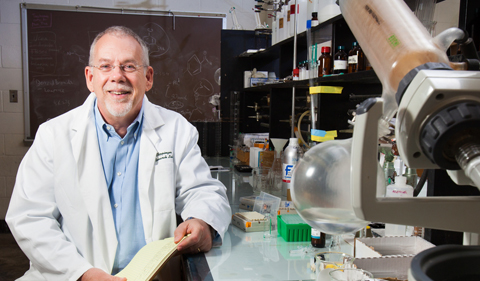
Dr. Stephen Bergmeier, Professor and Chair of Chemistry & Biochemistry. Photo by Ohio University / Jonathan Adams.
Ohio University has launched a new doctoral program in translational biomedical sciences that will give students a broad base of knowledge to tackle complex health issues.
Students and faculty affiliated with the program will be eligible for five new research fellowships and awards funded in part by a $2 million gift from Ohio University faculty and staff donors John and Char Kopchick and $1.9 million in match support from five university colleges and offices.
The translational biomedical sciences program, approved by the Ohio Board of Regents this month, is the first of its kind in the state of Ohio. Graduate students in this interdisciplinary program will work with faculty mentors from two disciplines to craft a unique curriculum that aims to improve the health of individuals and the community by turning research discoveries into diagnostic tools, medicines, procedures, policies and education.
“The program is very focused on the understanding that in order to bring health care to the largest number of people, we need much more ‘outside of the box’ approaches,” said Sonsoles de Lacalle, Associate Professor of Biomedical Sciences in the Ohio University Heritage College of Osteopathic Medicine and director of the new doctoral program.
Ohio University developed the doctoral program in response to a major push by the National Institutes of Health to fund translational medicine efforts that draw on collaborations between researchers and clinicians and leverage new technologies and data analysis tools to increase the speed at which new treatments reach patients.
Ohio University’s Graduate College will serve as the academic home of the translational biomedical sciences doctoral program, which will be led by an interdisciplinary steering committee composed of Brian Clark and Jay Shubrook, Heritage College of Osteopathic Medicine; Lonnie Welch, Russ College of Engineering and Technology; Dr. Stephen Bergmeier, Professor and Chair of Chemistry & Biochemistry in the College of Arts & Sciences; and Darlene Berryman, College of Health Sciences and Professions/Heritage College of Osteopathic Medicine.
The steering committee, de Lacalle and Michael Boyle, a senior scientist with the Vice President for Research and Creative Activity division, were instrumental in developing the program, said Joseph Shields, vice president for research and creative activity and dean of the Graduate College.
The translational biomedical sciences initiative draws on the university’s existing strengths in public policy, health, medicine and psychology, as well as engineering and the basic sciences, Shields said. More than 50 faculty members in eight academic colleges have expressed interest in participating in the program.
The program will benefit from the $2 million donation made by the Kopchicks earlier this spring. The couple has earmarked funding for a research fellowship award, faculty support fund, undergraduate student support fund, research awards program and discretionary support fund for students and faculty affiliated with translational biomedical sciences or the university’s current molecular and cellular biology program. Five university colleges and offices—Heritage College of Osteopathic Medicine, Russ College of Engineering and Technology, College of Arts & Sciences, College of Health Sciences and Professions and the Vice President for Research and Creative Activity—will provide $1.9 million total in match support.
“The generous gift from the Kopchicks and matching funds from the colleges will have a large impact in enabling the successful launch of this forward-looking program,” Shields said.
Graduates of the translational biomedical sciences program will be well equipped to work with government agencies, health care systems, research laboratories and other entities seeking to make a difference in public health and wellness.
“This is the type of program that will allow students to be entrepreneurial and innovative in their efforts to make a powerful difference in the well-being of a large number of people,” Shields said.
Students will be able to join the program beginning in August 2014. The translational biomedical sciences program is developing a memorandum of understanding with the Heritage College of Osteopathic Medicine’s combined D.O./Ph.D. program, which de Lacalle also directs. The new doctoral program will serve as the primary option for the Ph.D. portion of that dual degree, she explained.



















Comments